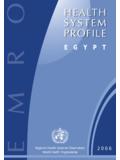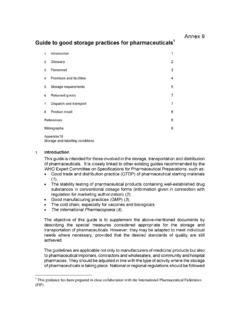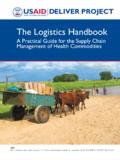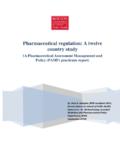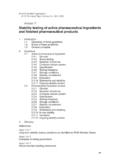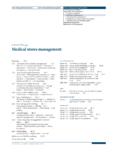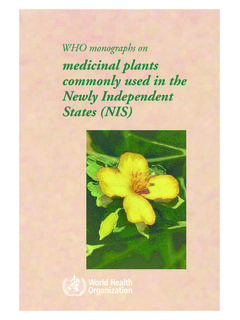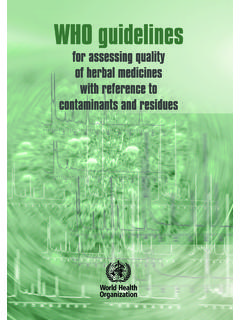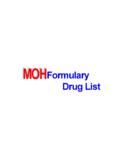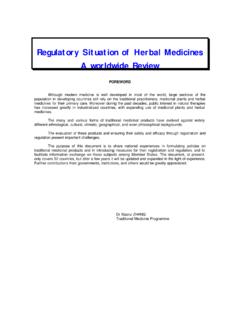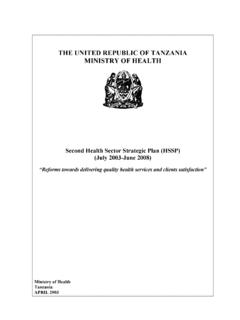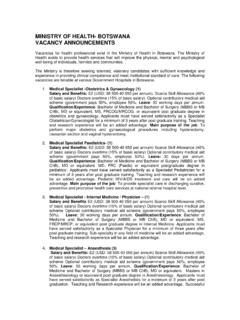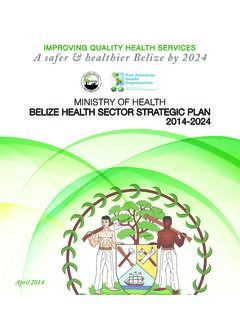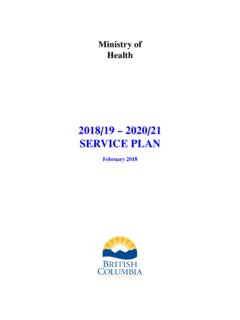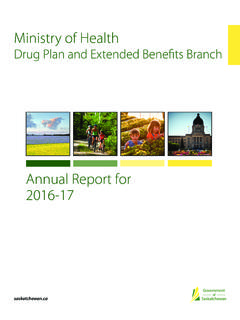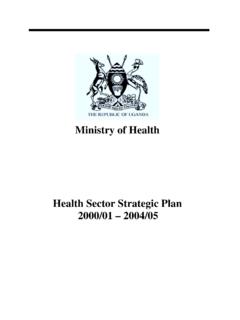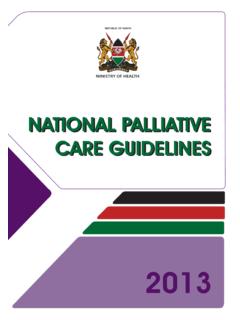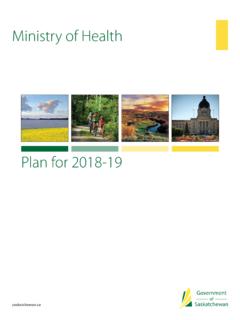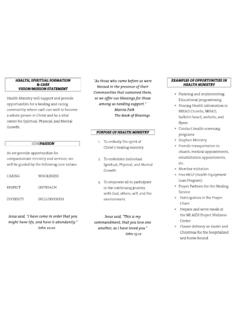Transcription of MINISTRY OF HEALTH - WHO | World Health …
1 THE UNITED REPUBLIC OF TANZANIA. MINISTRY OF HEALTH . NATIONAL HEALTH POLICY. MINISTRY OF HEALTH . OCTOBER, 2003. LIST OF CONTENTS. PAGE. Foreword. iii Acknowledgement. iv INTRODUCTION 1. HEALTH Sector Administrative Set Up .. 1. Role of the MINISTRY of .. 1. Demographic . 3. Economic Situation . 3. THE DEVELOPMENT VISION, MISSION AND OBJECTIVES OF. THE HEALTH POLICY .. 4. The Government Development Vision and the HEALTH Policy 4. Policy Vision 4. Policy Mission .. 4. Policy Objectives . 4. Policy 5. Clients Charter. 6. HEALTH SERVICES IN TANZANIA .. 8. National HEALTH Services .. 8. Decentralization of HEALTH Services to Regions and District and Devolution to Councils .. 8. Advocacy of HEALTH Sector Reform 9. Cooperation with other sectors 10. Basic Essential HEALTH Care .. 10. Primary HEALTH Care 10. Essential HEALTH Care Package 10. Food and Nutrition 15.
2 Chemicals Management and 16. Forensic Science . 17. Research . 17. STRUCTURE OF HEALTH SERVICES IN TANZANIA .. 18. The Structure of HEALTH services . 18. Traditional Medicine and Alternative Healing Systems (Alternative Medicine) .. 23. Public/Private Partnership . 24. HUMAN RESOURCES DEVELOPMENT AND MANAGEMENT .. 25. Human Resources Planning .. 25. Training . 25. i Funding and Financing Training of HEALTH Workers 25. Management of HEALTH Training Institutions .. 26. Deployment and Retention of Personnel . 26. HEALTH SERVICES FINANCING 27. Rationale of HEALTH Financing .. 27. Financing sources 27. Development Partners . 28. Resource Allocation 28. Financial Management 28. DEVELOPMENT PARTNERS . 30. Modalities of .. 30. MONITORING AND EVALUATION .. 31. ii FOREWORD. The HEALTH Policy is a vital guide towards HEALTH development of any country.
3 It is particularly, important in a country like ours where resources and technology are more limited than in other countries, which are relatively better off in both technology and resources. This Policy is a revision of the 1990 HEALTH Policy, which emphasized on the need for increasing community involvement in HEALTH development and improved access and equity in HEALTH and HEALTH services. The Policy recognizes the challenges of consolidating the principles of the previous HEALTH policy in community involvement, improved HEALTH services provision, access and equity while addressing the different dimensions of reforms that are taking place in the Public Sector. In order to address these challenges in the revision of this Policy, the MINISTRY of HEALTH underwent an iterative process. In achieving the Goal of HEALTH for All, as outlined in the WHO Alma Ata Conference held in 1978.
4 It also involved linking the Proposals for HEALTH Sector Reforms with the 1990 policy document. The link between the National HEALTH Policy 1990 and the Proposals for HEALTH Sector Reforms facilitated the development of the first draft of this revised National HEALTH Policy document, which was widely discussed in the MINISTRY before being disseminated to key stakeholders including the President's Office, Regional Administration and Local Government, other Central and Line Ministries and Development Partners. The consultation led to the enrichment in understanding the context of the revision of the Policy as well as improvements in the content. Since a HEALTH Policy formulation is an ongoing process, the MINISTRY of HEALTH would like to welcome positive and constructive comments from all stakeholders. The comments will be used for the next review, which will be undertaken after five years of implementation of this policy.
5 Honourable Anna Magreth Abdallah, MP. Minister for HEALTH . iii ACKNOWLEDGEMENT. Preparation of this document has been accomplished through involvement of different stakeholders. The involvement included discussions and consultations at different levels over a period of one year. These discussions and consultations were at times difficult because of the vast knowledge and different opinions on development of the HEALTH Sector among the stakeholders. Divergent opinions and views have helped to refine and strengthen the Policy in the new environment of the changing Public Sector. It is for this reason that the MINISTRY of HEALTH would like to recognise and acknowledge and commend all participants for their contributions towards revising the 1990 HEALTH Policy. The MINISTRY would also like to register its sincere appreciation to the Civil Society, the Private Sector, other Ministries and International Organisations both multi and bilateral which provided valuable comments, views, suggestions and recommendations.
6 The MINISTRY of HEALTH would therefore wish to take this opportunity to thank all those who actively took part in the revision of the 1990 HEALTH Policy document for the betterment of HEALTH development in Tanzania. Permanent Secretary MINISTRY of HEALTH iv INTRODUCTION. The National HEALTH Policy is aimed at providing direction towards improvement and sustainability of the HEALTH status of all the people, by reducing disability, morbidity and mortality, improving nutritional status and raising life expectancy. The policy recognizes that, good HEALTH is a major resource essential for poverty eradication and economic development. HEALTH Sector Administrative Set Up Tanzania is the union between Tanganyika (Tanzania Mainland) and Zanzibar. This HEALTH Policy takes care of Tanzania Mainland. Tanzania Mainland is divided into 21 administrative Regions.
7 It is further divided into 106 Districts with 121 Council Authorities. Each District is subdivided into Divisions, Wards, Villages and Vitongoji/Mitaa . Under the current administrative set-up, provision of HEALTH services is divided into 3. levels, namely, National, Regional and District. Tanzania HEALTH System is organized in a referral pyramid, starting from the village level, where there are village HEALTH posts; ward level, where there are community dispensaries; divisional level, where there are rural HEALTH centres;. district level, where there are district or district designated hospitals; regional level, where there are regional hospitals; zonal level, where there are referral/consultant hospitals and national level, where there are national and specialized hospitals. At the National level, the MINISTRY of HEALTH administers and supervises the National Hospitals, Consultant Referral Hospitals, Special Hospitals, Training Institutions, Executive Agencies and Regulatory Authorities.
8 At the Regional level, provision of HEALTH services is vested to the Regional Administrative Secretary with technical guidance of Regional HEALTH Management Team. At the district level, management and administration of HEALTH services has been devolved into district through their respective Council Authorities, HEALTH Service Boards, Facility Committees and HEALTH Management Teams. Role of the MINISTRY of HEALTH The MINISTRY of HEALTH as a technical MINISTRY is responsible for all matters pertaining to HEALTH in the country. The role of the HEALTH Sector are executed at three levels: - Central, Regional and Districts. 1. At the Central level the MINISTRY of HEALTH is responsible for: - - Policy formulation, HEALTH legislation, regulation and control;. - Resource mobilization and allocation, coordination and intersectoral linkages;. - Public HEALTH related interventions.
9 - Management support of level three hospitals including National, Referral, and Special Hospitals;. - Supervision and Monitoring of special and Referral Hospitals owned by NGOs;. - Provision of feedback to other levels;. - Training of key professional HEALTH cadres and monitoring quality of training;. - Monitoring and evaluation of HEALTH services countrywide;. - Supervision and inspection of provision of HEALTH services;. - HEALTH research;. - Management of Executive Agencies. At Regional level, the Regional HEALTH Administration under the Regional Secretariat has the following roles: - Mobilizes resources - Interprets policies into actions;. - Provides technical support to the districts;. - Supports supervision and inspection of district HEALTH services;. - Links between Districts and Central MINISTRY of HEALTH in matters pertaining to standards and quality of HEALTH care both public and private.
10 - Provides feedback to other levels. At District level, the District HEALTH Administration under the respective Council Authorities has the following roles: - Provides HEALTH Service at level one which include the District Hospital, other Hospitals, HEALTH Centers and Dispensaries;. - Prepares Comprehensive District HEALTH Plans and regular reporting on implementation;. - Provides feedback to other levels including to the community;. 2. - Coordinates, supports supervision, monitoring and inspection of all HEALTH facilities and activities in the district;. - Mobilises resources and management;. - Ensures communities are responsible in taking care of their own HEALTH and also the safety of medicine and equipment in their HEALTH facilities. Demographic Profile The population of Tanzania Mainland is 33,584,607 as per the 2002 population census.
